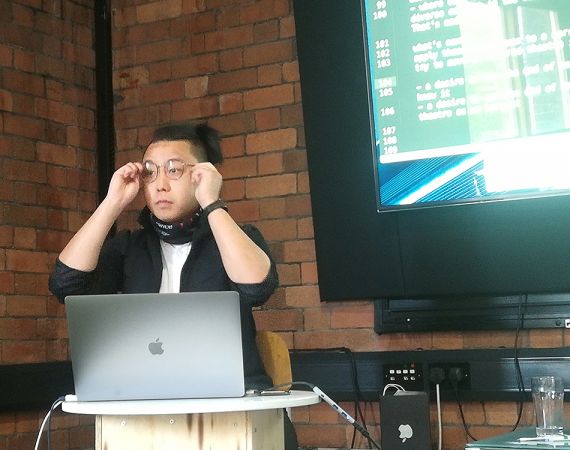Lunchtime talk write-up
Posted on Tue 5 Jun 2018
Mayfest co-production: Automated Theatre and Human Agency
Remy is one third of Hong Kong Exile, an interdisciplinary arts company and non-profit organization based in Vancouver.

Posted by
Speaker
Remy Siu
Remy Siu 蕭逸南 (b.1990) is a composer and new media artist based in Vancouver, BC. Recently, his work has involved the construction of automated and variable performance apparatuses that employ light, sound, software, and the body. He is interested in creating friction and stakes between the performer, the interface, and the system through the use of game mechanics and failure. His output spans chamber music, dance, theatre, installations, and audio-visual work.With Mayfest in full swing, run by our lovely friends at MAYK, we have invited Composer and New Media Artist, Remy Siu who is working on Mayfest show, Town Choir to tell us more about his work. Remy is one third of Hong Kong Exile, an interdisciplinary arts company and non-profit organization based in Vancouver.
Five Things I Learned:
1. Remy’s background is in music and he creates live performance apparatus from a combination of custom software and ubiquitous hardware. Remy sees this as an extension of his music, creating experimental compositions using game mechanics and algorithms that run in real time. Remy takes a critical approach to performance and continually disrupts these processes to avoid them becoming predictable or rehearsed.
2. Remy studied traditional score notation and chamber music as well as making electronic music in his own time. Remy was envious of dance and theatre processes. Typically, the group devises and develops new ideas together through workshops to create the show, but in comparison he found music composition to be solitary and boring. Remy wanted to merge these more interesting devising practices into his music.
3. There were a lot of economic forces against Remy in Vancouver, a) its a very expensive place, b) there is not enough rehearsal space and c) there’s not enough young chamber ensembles. Remy started thinking about how he could creatively overcome these and was inspired by Xenakis’s critical approach to score writing. Remy start to create task-based games to make music; the scores could be created deliberately so that musicians struggle through the performance.
4. Foxconn Frequency 3 features one visibly Chinese performer who works through the performance live without rehearsals. She is reacting to commands and has to learn the gestures in real time in front of an audience. She views the gesture and has to attain a certain score to move on to the next one. The player doesn’t have any real agency in the performance. Design for professionals. Remy thought about designing a version for anyone, not just musicians and give them more agency.
5. Remy started thinking about analogue games vs. digital games. Analogue games take longer, as people are slower and have to self-regulate, but when the computer takes care of those things the cognitive load of the players is reduced and the game becomes more interesting- the mechanics are taken care of. In modular music, notation is treated more like lego blocks where the musicians can construct their own ensemble.
